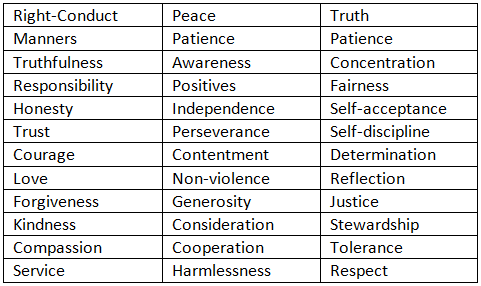Best Study Material for UPSC Exam
UPSC Exam > UPSC Notes > UPSC Mains: Ethics, Integrity & Aptitude > Fundamental Human Values
Fundamental Human Values | UPSC Mains: Ethics, Integrity & Aptitude PDF Download
Fundamental Human Values

Basic inherent values in humans include truth, honesty, loyalty, love, and peace, as they highlight the fundamental goodness of both individuals and society. These values are unifying, transcending social, cultural, religious, and sectarian boundaries, and are considered universal, timeless, and eternal, applying to all people.
The following are fundamental human values:
Values of a Leader:
- Love for justice
- Selflessness
- Courage
Values of an Administrator:
- Non-discrimination
- Discipline
- Lawfulness
- Loyalty
Values of Reformers:
- Reason
- Contentment
- Humanism
- Dignity for all
- Social equality
List of human values

Stages of moral/value development (Kohleberg):
- Pre-conventional Level (birth to preschool): This stage is characterized by obedience to avoid punishment and a desire for rewards. Actions are self-oriented.
- Conventional Level (school to higher education): In this stage, individuals focus on interpersonal relationships and conforming to societal norms. They also adhere to authority and social order to maintain stability.
- Post-conventional Level (after college life): At this level, individuals recognize the importance of social contracts and focus on universal ethical principles that transcend specific rules.
How are values formed?
- Formation of Values: Individuals develop their values through socialization from sources such as parents, religious institutions, friends, personal experiences, and society at large.
- Influences on Individual Values: Our values are shaped by religious beliefs, social systems, and, to some degree, socioeconomic conditions.
- Terminal and Instrumental Values: Terminal values evolve over time, while instrumental values are more directly influenced by the circumstances individuals face.
The document Fundamental Human Values | UPSC Mains: Ethics, Integrity & Aptitude is a part of the UPSC Course UPSC Mains: Ethics, Integrity & Aptitude.
All you need of UPSC at this link: UPSC
|
78 videos|100 docs
|
FAQs on Fundamental Human Values - UPSC Mains: Ethics, Integrity & Aptitude
| 1. What are the fundamental human values that are important for societal development? |  |
| 2. How do fundamental human values relate to the UPSC exam syllabus? |  |
Ans.Fundamental human values are closely related to the UPSC exam syllabus, particularly in subjects such as Ethics, Integrity, and Aptitude. These values are assessed through case studies, essay writing, and general studies, emphasizing the importance of ethical governance and the role of values in public administration.
| 3. Why is it important to incorporate human values in public administration? |  |
Ans.Incorporating human values in public administration is crucial as it ensures that policies and decisions are made with empathy and fairness. This leads to better governance, increased public trust, and improved service delivery, ultimately contributing to the overall well-being of society.
| 4. What role do human values play in the personal development of UPSC aspirants? |  |
Ans.Human values play a significant role in the personal development of UPSC aspirants by shaping their character and decision-making abilities. Upholding values like integrity and perseverance helps aspirants navigate the challenges of their preparation journey and prepares them for ethical leadership roles in the future.
| 5. How can one develop fundamental human values for effective leadership? |  |
Ans.Developing fundamental human values for effective leadership can be achieved through self-reflection, continuous learning, and practice. Engaging in community service, embracing diversity, and seeking feedback from peers can also enhance one's understanding and application of these values in leadership roles.
Related Searches





















